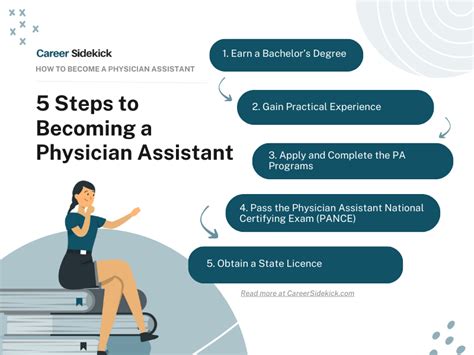Empowering Aspiring Healthcare Professionals

The Keiser University Physician Assistant (PA) program provides an immersive educational experience that prepares students for a successful career as a Certified Physician Assistant (PA-C). Ranked among the top PA programs in the nation, Keiser equips graduates with the clinical skills, patient care knowledge, and collaborative mindset to thrive in the dynamic healthcare environment.
Understanding Physician Assistants
What is a Physician Assistant?
A PA is a highly trained healthcare professional who works in collaboration with physicians and other healthcare providers to deliver comprehensive patient care. PAs have the authority to diagnose and treat illnesses, perform procedures, prescribe medications, and educate patients.
Scope of Practice
PAs work in various clinical settings, including hospitals, clinics, urgent care centers, and private practices. Their responsibilities cover a wide range of medical specialties, including:
- Primary care
- General medicine
- Emergency medicine
- Surgery
- Orthopedics
- Cardiology
The Keiser PA Program Experience
Rigorous Curriculum
The Keiser PA program is a 28-month, full-time program that combines academic coursework, clinical rotations, and simulation labs. Students gain a comprehensive foundation in:
- Anatomy
- Physiology
- Pharmacology
- Clinical medicine
- Surgery
- Behavioral sciences
Clinical Rotations
Students complete 10 clinical rotations in various healthcare settings, allowing them to apply their knowledge and skills in real-world scenarios. Rotations include:
- Family medicine
- Internal medicine
- Pediatrics
- Surgery
- Emergency medicine
Simulation Labs
Keiser’s state-of-the-art simulation labs provide a safe and realistic environment for students to practice their patient care skills. These labs are equipped with:
- High-fidelity manikins
- Standardized patients
- Virtual reality technology
Benefits of the Keiser PA Program
High Employment Rates
The Bureau of Labor Statistics projects a 31% increase in PA employment from 2020 to 2030. With its rigorous curriculum and clinical rotations, Keiser PA graduates are prepared to meet the growing demand for PAs.
Career Advancement Opportunities
PAs can pursue various career paths, including:
- Clinical practice
- Specialty practice
- Education
- Administration
Professional Recognition
Keiser’s PA program is accredited by the Accreditation Review Commission on Education for the Physician Assistant (ARC-PA). This accreditation ensures that graduates meet the national standards for PA education.
Eligibility Requirements
Admission Criteria
To apply to the Keiser PA program, students must meet the following requirements:
- Bachelor’s degree in a science-related field with a minimum GPA of 3.0
- Two years of healthcare experience
- Competitive GRE scores
- Strong letters of recommendation
How to Apply
The Keiser PA program accepts applications through the Centralized Application Service for Physician Assistants (CASPA). Applicants must submit the following materials:
- Official transcripts
- Letters of recommendation
- Personal statement
- GRE scores
- Healthcare experience documentation
Conclusion
The Keiser University Physician Assistant program offers an exceptional educational journey that empowers students to become highly skilled and compassionate healthcare professionals. With its rigorous curriculum, clinical rotations, and simulation labs, Keiser prepares graduates for a fulfilling and rewarding career as a Certified Physician Assistant.
Why Become a Physician Assistant?
There are several reasons why individuals choose to pursue a career as a PA:
- High earning potential: PAs are in high demand, with a median annual salary of $121,530.
- Job security: The PA profession is projected to continue growing in the coming years.
- Flexible career options: PAs can work in a variety of clinical settings and specialties.
- Patient impact: PAs play a crucial role in providing accessible and compassionate healthcare to patients.
Pros and Cons of Being a Physician Assistant
Pros:
- High earning potential
- Job security
- Flexible career options
- Patient impact
Cons:
- Rigorous training program
- Extensive work hours
- Limited autonomy compared to physicians
Frequently Asked Questions (FAQs)
- What is the difference between a PA and a nurse practitioner (NP)?
PAs and NPs have similar roles and responsibilities in patient care. However, PAs typically work under the supervision of a physician, while NPs have more autonomous practice.
- How long does it take to become a PA?
The Keiser PA program takes 28 months to complete.
- What is the job outlook for PAs?
The job outlook for PAs is excellent, with a projected 31% increase in employment from 2020 to 2030.
- How much do PAs earn?
The median annual salary for PAs is $121,530.
- Is the Keiser PA program accredited?
Yes, the Keiser PA program is accredited by the Accreditation Review Commission on Education for the Physician Assistant (ARC-PA).
- What is the application deadline for the Keiser PA program?
The application deadline for the Keiser PA program is October 15th.
- What is the acceptance rate for the Keiser PA program?
The acceptance rate for the Keiser PA program is approximately 10%.
- What are the financial aid options available for the Keiser PA program?
Keiser offers various financial aid options, including scholarships, grants, and loans.
